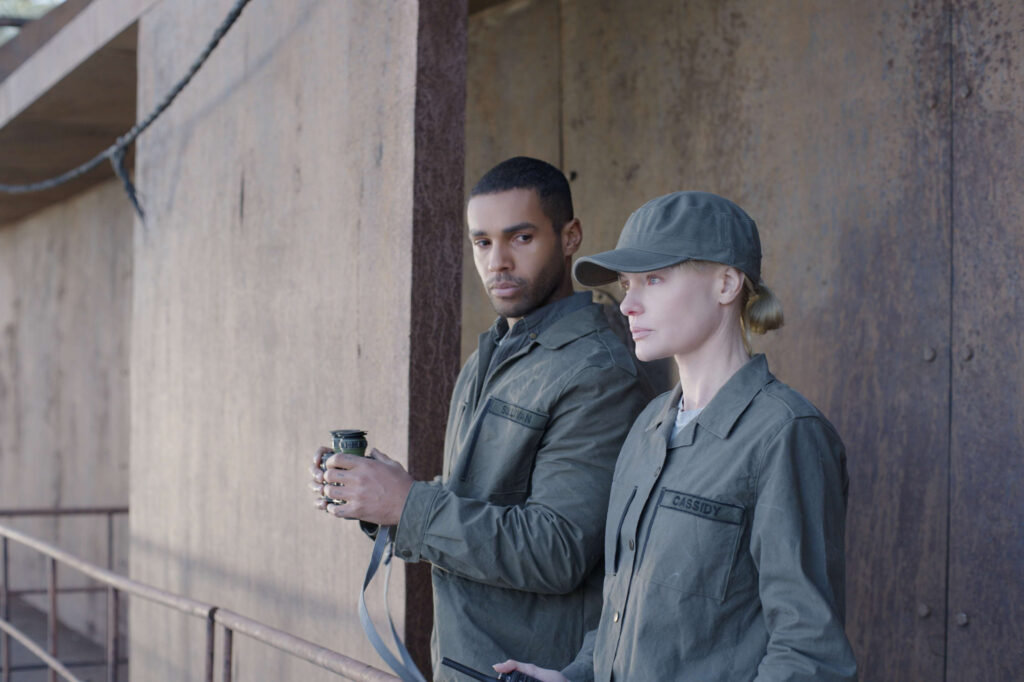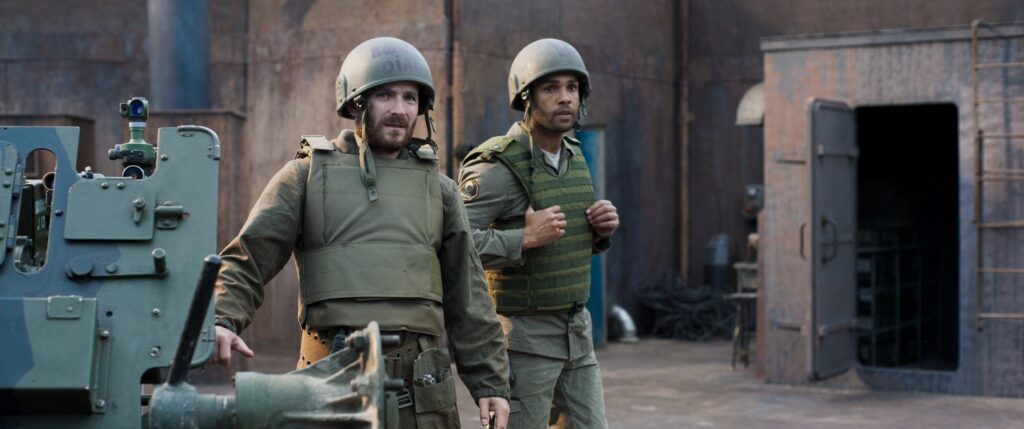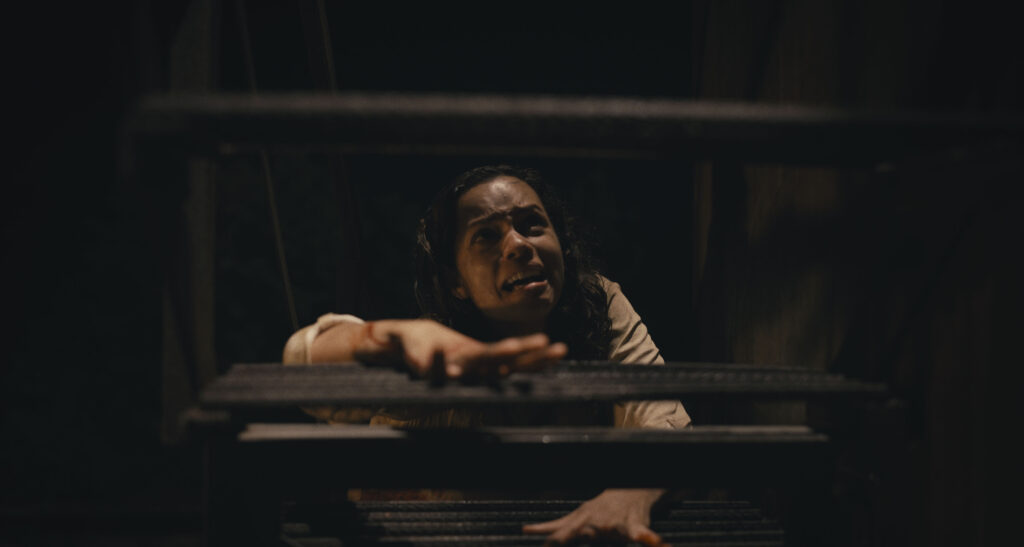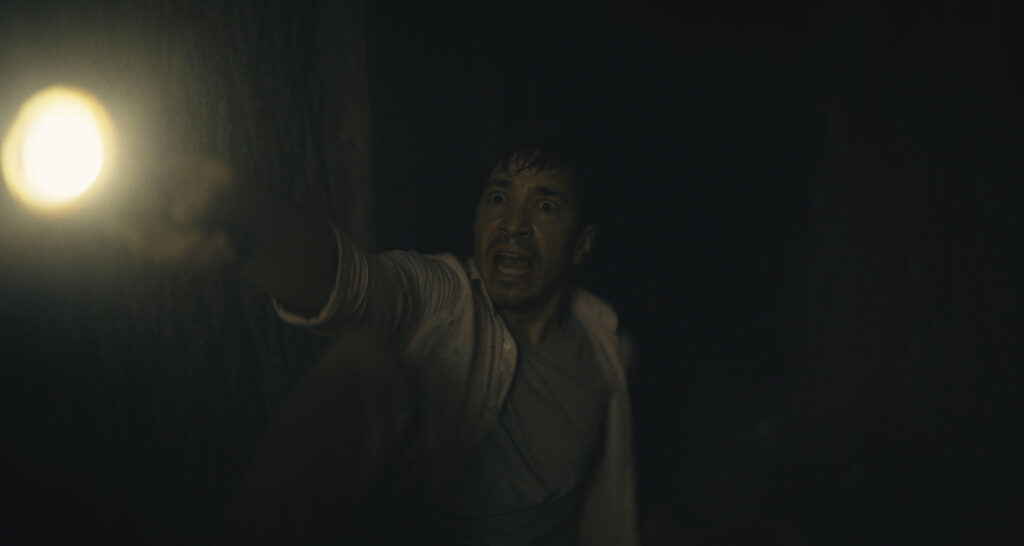April 24, 2023
by Carla Hay

Culture Representation: Taking place in New Mexico, the dramatic film “The Locksmith” features a predominantly white cast of characters (with a few African Americans and Latinos) representing the working-class, middle-class and wealthy.
Culture Clash: After spending 10 years in prison on burglary charges, a former locksmith is released from prison and gets lured back into a life of crime while he tries to make amends with his family and with the daughter of his former partner in crime.
Culture Audience: “The Locksmith” will appeal primarily to people who don’t mind watching stupid crime dramas.
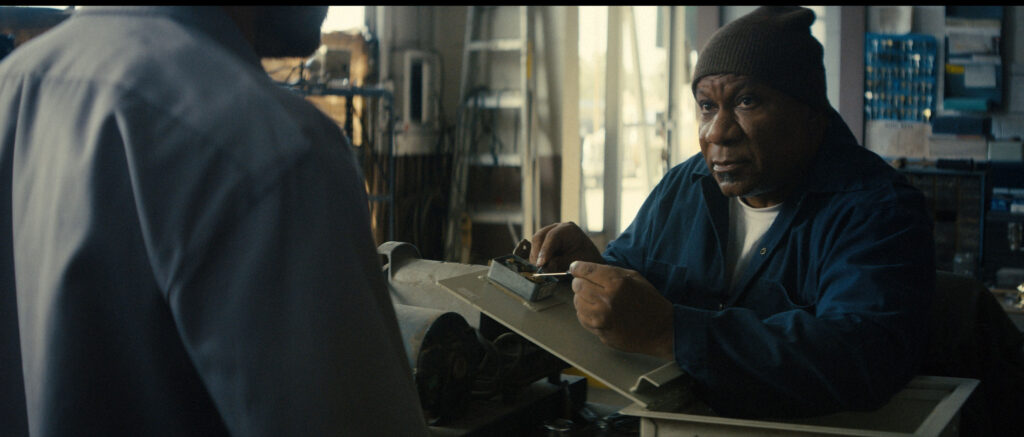
“The Locksmith” is an idiotic flop whose screenplay should’ve stayed locked up in places where bad screenplays never get made into movies. The plot twists are really plot holes. The performances and direction are low-quality and uninspired. Everything about this movie looks misguided and fake.
Directed by Nicolas Harvard, “The Locksmith” (which is Harvard’s feature-film directorial debut) was written by Joe Russo and Chris LaMont. It might be surprising for some people to know that Russo co-directed several Marvel Studios blockbusters, including 2018’s “Avengers: Infinity War” and 2019’s “Avengers: Endgame.” It just goes to show that directing mega-hits doesn’t automatically turn someone into a great screenwriter. “The Locksmith” is an example of one bad decision after another, not just from the movie’s main characters but also the filmmakers.
“The Locksmith” (which takes place and was filmed in New Mexico) begins by showing a nighttime break-in at a warehouse by two burglars who are there to steal a large amount of cash from a locked safe. No one else is in the warehouse. Miller Graham (played by Ryan Phillippe) and his partner Kevin Reyes (played by George Akram) both have different feelings about this theft.
Before they broke into the warehouse, Kevin said to Miller: “I’ve got a bad feeling about this, man. Didn’t Frank pass on this job?” Miller replies, “I need the money, Kevin.” Unfortunately for these two thieves, the cash in the safe has a motion sensor, which triggers a silent alarm. Before these two burglars can make a getaway, police arrive to apprehend them.
The first cop on the scene is Ian Zwick (played by Jeffrey Nordling), who does something that unarmed Miller and Kevin don’t expect: Ian shoots out the tires of the getaway car and then coldly murders Kevin by shooting him, even though Kevin had no weapon and was not resisting arrest. Miller surrenders without a fight. When other cops arrive as backup, Ian lies to them and says that he shot Kevin in self-defense. Miller knows the truth, but he doesn’t say anything, because he knows that the other cops won’t believe him.
The movie then fast-forwards to 10 years later. Miller has gotten out of prison. He actually had a prison sentence that was longer than 10 years, but he was released early due to good behavior. At various times in the movie, Miller meets with his parole officer Sharon (played by Livia Treviño), who is firm but empathetic about Miller trying to turn his life around. It’s a lot easier said than done for Miller.
The person who gives Miller a car ride after Miller gets out of prison is his former boss Frank (played by Ving Rhames), who owns a small business as a locksmith. Frank feels a little guilty because he was the one who influenced Miller to do the burglary that got Miller arrested and Kevin killed. Therefore, Frank offers to give Miller a job, but he says it can only be as a handyman, since Miller’s felony theft conviction means that Miller lost his locksmith license.
Kevin was a single father raising a teenage daughter named April, who was put in the foster care system after Kevin died. After Miller gets out of prison, Frank mentions that Frank tried to become a father figure to April, but she rejected his attempts. Frank has not kept in touch with April for years.
Miller has a lot of things he wants to make amends for that he couldn’t do while he was in prison. For starters, Miller was married with a baby daughter named Lindsay Graham when he was sent to prison. His wife Beth Fisher (played by Kate Bosworth) divorced him while he was in prison. Miller has not seen or talked to Lindsay since being sent to prison.
Shortly after his prison release, Miller has an uncomfortable reunion with Beth and Lindsay. They have met at Miller’s request. The meeting place that Miller chose is a diner where he and Beth used to go on dates when they were a happy couple. Lindsay (played by Madeleine Guilbot), who is now 10 years old, is polite but shy around Miller, whom she thinks of as a stranger.
Miller is apologetic to Beth about how much he hurt their family, but he promises her that he’s turning his life around and he wants to be a good father to Lindsay. He asks Beth to let him prove how much he’s changed. Beth is very skeptical and standoffish, but she reluctantly agrees to Miller having visits with Lindsay.
One day, Frank sends Miller out on a locksmith job, even though Miller doesn’t have a license. The customer is a wealthy businessman named Garrett Field (played by Charlie Weber), who is smug and arrogant with almost everyone. Miller has been assigned to do a lock job at one of the apartment buildings owned by Garrett. Miller is shocked to find out that the person who recommended him for the job is Garrett’s employee April Reyes (played by Gabriela Quezada), the daughter of Miller’s deceased thief partner Kevin.
April is now in her 20s, and she has turned into a very jaded person because of all the bad experiences she’s had in her life. She shows up unexpectedly at the apartment building to talk to Miller, who has an awkward reunion with her. April tells Miller that she’s in a lot of trouble (she doesn’t go into details at first), and she asks Miller to do one last burglary, so she can have the cash to “start a new life.” April makes Miller feel guilty about the way Kevin died, but Miller refuses her request, because he doesn’t want to risk going back to prison.
Shortly after finishing the job at Garrett’s apartment building, Miller is pulled over by three cops: his old enemy Ian (who is now a police sergeant) and two of Ian’s subordinates in the police department’s vice division: Detective Perez (played by Noel Gugliemi, also known as Noel G) and Detective Jones (played by Bourke Floyd), who enable Ian’s bullying. Ian, Perez and Jones rough up Miller a little bit. Ian warns Miller that he better not tell anyone what happened the night that Kevin was shot to death.
Miller assures these corrupt cops that he won’t tell anyone. But in order to further intimidate Miller, Ian does a search of the company van that Miller is driving. The cops find locksmith tools in the van, so they assume that Miller is working as an unlicensed locksmith, which is in violation of Miller’s parole. Miller says he’s just a handyman, but the cops don’t believe him. And so, Miller is arrested on the spot.
Miller is eventually released with no charges being filed, because Police Chief Stern (played by Tom Wright) has decided there was no proof that Miller actually used these locksmith tools. And guess who also happens to be a cop working at the same police station? Miller’s ex-wife Beth, who is angry and embarrassed that Miller got arrested again. Ian is retiring soon, and he tells Beth that he’s recommended that she get a promotion to work in the vice division.
“The Locksmith” becomes a tangled and silly mess when Miller changes his mind about committing a burglary for April, after she tells him that her boss Garrett has been physically abusing her. April shows Miller some bruises on her body that she says are from Garrett’s abuse. This information is already revealed in “The Locksmith” trailer, which gives away about 75% of the movie’s ludicrous plot.
Of course, things go very wrong with this burglary too. There are double-crosses, shootouts, at least one kidnapping and many scenes that don’t look believable at all. Certain scenarios in the movie make no sense and just insult viewers’ intelligence. “The Locksmith” is ultimately as unappealing as a rusty lock.
Screen Media Films released “The Locksmith” in select U.S. cinemas, on digital and VOD on February 3, 2023.

